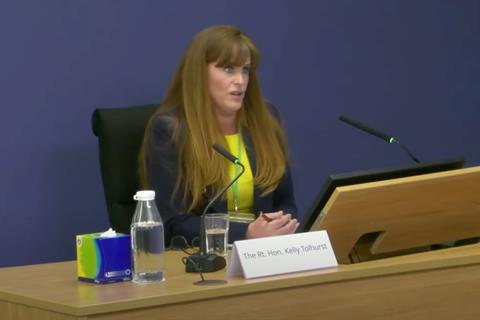A former minister overseeing the Post Office has admitted that legal advice on the group litigation was ‘utterly incorrect’ but insisted that the government could not interfere in the process.
Kelly Tolhurst, who was a Conservative junior minister for postal affairs from July 2018 to February 2020, was in post during the disastrous Bates litigation robustly defended by the Post Office. Her time also coincided with the decision – again ill-fated – to apply for Mr Justice Fraser to recuse himself.
Giving evidence to the Post Office Inquiry yesterday, Tolhurst said the legal advice given about the prospects of success had proved to be ‘utterly incorrect’.
‘I just did not get the impression at any time that POL thought they could be found to be wrong on the key issues, indeed I was constantly being reassured,’ she said. ‘I do not know where I would have gone at the time to get the right information and to have seen some of this coming.’
Tolhurst said she had been briefed at the start of her time in post that a civil claim was being brought by a number of sub-postmasters alleging problems with the Horizon IT system.
She did not recall any advice being given about the risks of litigation, nor any impression that the Post Office was anxious about the claims.
When she demanded more information and met with chief executive Paula Vennells, she said that just five minutes were allocated to discussing the litigation, compared with 20 minutes for discussing the Post Office’s financial performance and growth.
‘Looking back now, I know that I was not provided with the right information to properly oversee and challenge the litigation strategy,’ she added. ‘The true position on the problems with Horizon was never disclosed and I never had any cause to think that I was being misled.’
Problems with Horizon were downplayed, she recalled, and while Post Office bosses thought that the court might find against the organisation on minor points, they ‘did not think they would lose on anything significant’.

Tolhurst expressed concern in October 2018 – five months before the first damning judgment - that the court might see proceedings as a ‘little guy’ going up against a corporate institution, and so be inclined to favour the sub-postmasters. She also wanted to know if losing the case might cause the Post Office a financial crisis. ‘Frustratingly, POL were not willing or perhaps not able to provide any concrete advice on their liability at the meeting,’ said Tolhurst.
She recalled there was ‘certainly some appetite’ in the business department to push for settlement of the claims without going to court, but ‘strong assurances’ were received that POL had received good legal advice and was confident in defending the case.
She added: ‘It remains my view that at that time of the common issues trial there was no basis upon which I could have instructed POL to settle the litigation, against the advice of their legal advisors.
‘I have no doubt it would have been seen as a significant interference with POL operational matters, and I do not consider that I would have had any support from within the civil service to take that step.’
When the first judgment was handed down, she felt ‘embarrassment’ and was ‘appalled that the judge had found POL to have behaved so reprehensibly’.
Tolhurst told the inquiry she had prepared a letter to be sent to MP colleagues, but civil servants in UK Government Investments (part of the Treasury) took out references to postmasters having been ‘wronged’. This was on the basis it might otherwise have affected later trials in the group litigation.
Ministers had ‘grave concerns’ about the recusal application and tried to discourage it, said Tolhurst. But she was told that she should not be involved in formal decision-making on this issue. She said advice from lawyers that there was no other option but to pursue recusal were ‘weasel words’, but there was no scope for ministers to interfere.
Tolhurst added that the appointment of international firm Herbert Smith Freehills to take over the litigation was welcome as the legal advice to that point had been ‘wildly off beam’.
The inquiry continues today with evidence from Labour's Pat McFadden and Liberal Democrat leader Ed Davey, ministers who held the Post Office brief during the time of prosecutions.






























